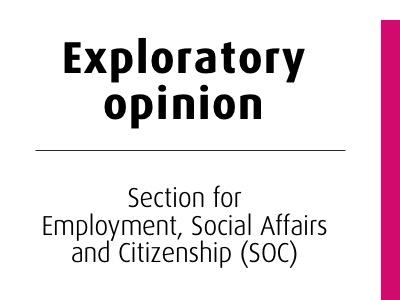European Economic
and Social Committee
Strengthening civil dialogue and participatory democracy in the EU: a path forward
Background:
Amid growing disaffection with traditional politics and a rise in populism, improving citizen participation in decision-making is a crucial component of European democracy and a prerequisite for the legitimacy of EU policies in the eyes of citizens. Ahead of the European elections, this is of paramount importance.
In accordance with the Article 11 of the Treaty of the European Union, EU institutions have a joint responsibility to ensure that organised civil society is actively involved in the formulation of EU laws and the related processes. Article 11 stipulates that" the institutions shall, by appropriate means, give citizens and representative associations the opportunity to make known and publicly exchange their views in all areas of Union action".
However, the implementation of Article 11 has so far been patchy and inconsistent. There is still no uniform vision and understanding of the concept of civil society or a civil dialogue, with no clear definition of what they constitute. Europe's participatory democracy is battling with a shrinking civic space and a lack of structured citizen participation.
The EESC is stressing the urgency of stepping up the implementation of Article 11. This should be a follow-up to the Conference on the Future of Europe (CoFoE), a landmark initiative and major democratic exercise, which included a series of citizen-led debates on matters directly affecting the lives of European citizens. As a follow-up to the CoFoE, the Commission has so far organised three citizens' panels which are becoming a regular feature of democratic life in the EU. The EESC will participate in the two panels coming up.
In December, the Commission adopted the Defence of Democracy Package which included a recommendation aimed at increasing the participation of citizens and civil society in policy-making across all levels of governance.
Those are some of the instruments developed by the Commission to incorporate citizen participation in its policy-making processes.
In this opinion, requested by the Belgian Presidency of the Council of the EU, the EESC examines how to create a better system for people to participate directly in decision-making.
Key points:
In the opinion, the EESC:
- calls for a strategy for civil dialogue, resulting in an action plan, and potentially an interinstitutional agreement among EU institutions for improved civil dialogue facilitated by the EESC;
- advocates for making Article 11 TEU effective by strengthening actors in the different EU institutions dealing with civil dialogue and create an annual civil dialogue scoreboard tracing the EU's engagement with civil society, and an accreditation mechanism for CSOs;
- reiterates that the EESC should be at the centre of civil society consultation and civil dialogue in general and calls for a stronger role for the Committee in participatory democracy, including being a potential hub for citizen panels.
The text of the draft opinion can be found here.
Additional information
Section: Employment, Social Affairs and Citizenship (SOC)
Opinion number: SOC/782
Opinion type: exploratory opinion requested by the Belgian Presidency
Rapporteur: Pietro Vittorio Barbieri
Co-rapporteur: Miranda Ulens
Reference: Referral by the Belgian presidency of the Council, letter of 10/7/2023, Article 304 of TFEU
Date of adoption by section: 23/01/2024
Result of the vote: 78 in favour/1 against/2 abstentions
Date of adoption in plenary: 15/02/2024
Result of the vote: 173 in favour/ 0 against/ 3 abstentions
Contacts:
Press officer: Laura Lui
Tel.: 00 32 2 546 9189
email: laurairena.lui@eesc.europa.eu
Administrator: June Bedaton
Tel: 00 32 2 546 8134
email: June.Bedaton@eesc.europa.eu
